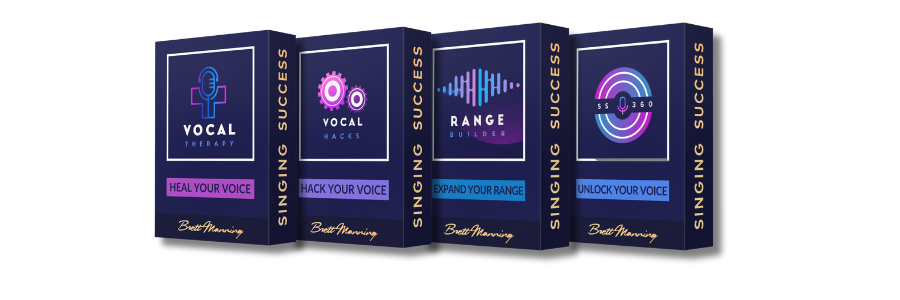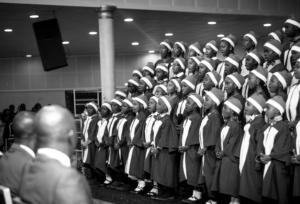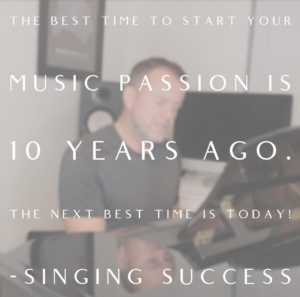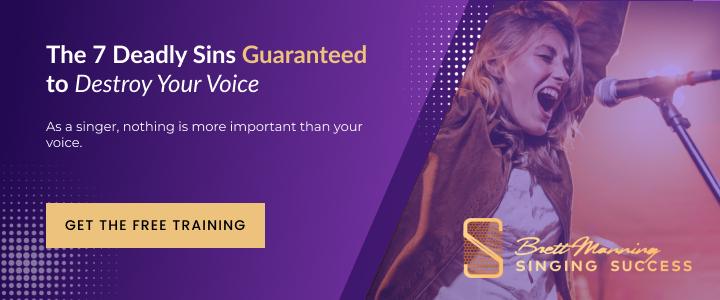Can Anyone Learn to Sing?
Let me start by saying that I’ve taught countless, ‘so-called’ non-singers to sing and to sing well. But guess who always asks me this question?
It is always non-singers. I ask them—if they appear to be big, tough athletes—if they are good at ballet. Or some similar rhetorical question that I already know the answer to.
And, of course, they say no. Then, if I know they are ballers, I ask them if anyone can play basketball.
They usually say yeah, if:
- They practice
- They are somewhat athletic
- They are patient
- They learn to dribble, shoot and pass
- They get some coaching on the basics.
Or, It depends on how good they want to get.
Fast-Track Your Success!!

VIP Membership includes:
- Exclusive Facebook Group
- Interact with our vocal coaches–ask them YOUR question
- Live warmups
- Masterclasses and Q&As with Brett Manning and his guests
- SS360 QuickStart Program
- SS360 – The FULL Systematic Vocal Course
- Vocal Hacks
- Range Builder
- Mastering Mix
- Mastering Harmony
- Mastering Vibrato
- Vocal Therapy
- Plus…exclusive content only found here all along the way!
You can struggle on your own, or you can get direct access to the Nashville Coaches who have launched some of the biggest names in the music industry.
But Singing is Different
Yes and no. Very different from football and bowling. Somewhat different from dance, though they go together often, and somewhat similar to playing an instrument.
The difference is that YOU are the instrument. So I say this:
“It Depends”
The question “can anyone learn to sing?” is easily answered with a resounding YES, but this brings up more questions:
- How much does natural talent play into this?
- Will any vocal teacher do that?
- Are all singing lessons the same?
- How well do you want to get?
- What style of music do you want to sing?
- Are you patient enough to sing basic songs?
- Are you ok being a bad singer—along with most beginner singers—on your journey to becoming a better singer?
Singing requires practice. Good singing requires consistent practice. The greatest singers have tremendous daily practice habits, along with years of coach coaching!
Can Anyone Be Taught How to Sing? YES, but…
While some people come out of the womb and can sing naturally, the expression lacks nuance.
You see, most of us are born screaming high notes effortlessly and naturally. But nature versus nurture comes into play. Natural talent is often discovered in those who’ve seen a huge difference due to years of vocal coaching.
And so, with my high vocal range, most folks think it’s just a natural ability. They don’t know how horribly limited I was when I started singing.
So can anyone learn to sing? Remember this: if you can talk, you can sing! Most singers I’ve worked with have to retrain their bad habits from bad singers who’ve served as bad role models or poor training from coaches that just don’t understand how the voice works.
But singing is a skill. Assuming that all singers can just do it is like assuming Michael Jordan was never coached. He had tons of instruction, desire, drive, and determination.
A strong warning: MEAN vocal coaches have caused many singers to quit. Singing lessons can be enjoyable. But anger makes the vocal cords tight and hesitant. This is why my Singing Success associates are so encouraging. The results speak volumes. (pun intended). Find an encouraging voice teacher!

Singing: A Gift, a Talent, and a Skill
According to the Chicago Tribune: “Singing is more of a learned skill than a natural talent, said Steven Demorest, a music education professor at Northwestern University who recently published a study in the journal ‘Music Perception’ that compared the singing accuracy of kindergartners, sixth-graders and college-age adults.”
According to Merriam-Webster’s dictionary.
A Gift- often implies special favor by God or nature.
If you have a speaking voice, that is a gift. You didn’t create vocal cords, lungs, and your ‘vocal tract’ or ‘resonance chambers’ in the head that you were born with. Adding to this, if you can hear a note on the pitch and duplicate the tone you hear, have vibrato with zero training OR practice, can stay on the beat perfectly, and have an emotional delivery…. that’s a PURE gift.
A Talent- suggests a marked natural ability that needs to be developed.
See the progression here? Everyone has some gift and natural talent, but how will anyone learn to sing properly if they only rely on natural ability and refuse the knowledge and wisdom of a qualified voice teacher?
A Skill- the ability to use one’s knowledge effectively and readily in execution or performance.
It’s important to recognize that the level of instruction, determination, discipline, desire, and drive present in many ‘untalented’ singers, can and has produced some of the world’s greatest singers.
It can be safely assumed that we all have some level of the first two ingredients to sing or do almost any other skill task. But developing the skill starts with one thing: A DECISION.

Can A Good Singing Voice Be Taught?
According to Joanne Rutkowski, Ph.D., professor of music education and coordinator of music education programs at Penn State, “Everyone who can speak can learn to use a singing voice….the quality of the voice is dependent on many factors; however, barring a physical vocal disability, everyone can learn to sing well enough to sing basic songs.”
While I love citing my beloved and esteemed colleagues, I really only need to tell you that virtually all my certified coaches around the world have built their coaching studios off this proven assumption: If you can talk, you can sing.
So let’s answer this question with a surprise and say that a GREAT singing voice can be taught, and historically, this has been the case with great singers.
Mariah Carey was often regarded—especially in her early days— as one of the all-time greatest singers! (sorry, Mariah, I still love your voice). Her mom was an opera singer who taught/coached Mariah from a young age.

Getting a Vocal Coach
For many years, my coaching studio and my online singing courses have shared this company motto:
We Build Great Singers
Whether you start singing tomorrow at age 88 or have been singing in church, choir and Karaoke since kindergarten, the same rule applies: good vocal technique is necessary to build good singers. Most voice teachers would agree.
So imagine receiving great technical expertise from a gifted, talented vocal coach! Suddenly, those who hear you—even if you’re a new singer—think your singing talent is natural.
Often I hear people singing in small venues, and the first question I ask them is, “who is your coach?” Most of the time, they credit their gift to their training and their mentors.
If you want to learn to sing well and be a confident singer, be sure to look for the following attributes (take a deep breath) from your coach:
Characteristics of a great coach
STACKED= GENIUS
If you’re STACKED, you’ll more than likely be thought of as a GENIUS.
S- systematic
T- track record
A- authoritative
C- charismatic
K- knowledgable
E -experienced
D -diagnostic
Genius: In reality, most genius is uncovered and discovered through LEARNING. The more disciplined and driven, the more resolved and resourceful, the more a coach could be seen as a genius
STACKED DEFINED
Systematic- They don’t merely know vocal exercises but have a system or sequence of exercises to help you FIND your voice rather than FORCE your voice. They know the ‘formula’ that works for the majority of singers. If the techniques aren’t working, they quickly move on to the ‘diagnostic,’ which is the last trait in our list.
Track Record- This means a strong client list consisting of vocal icons (signed recording artists) in the music industry, as well as reviews from ordinary people singing extraordinarily well! I firmly believe anyone who wants to sing can usually find a great coach just off of track record. BUT…. here’s the flip side. I was coaching singers and getting results YEARS before I had built a substantial track record. So look for diamonds, and you’ll find them.
Authority- They have shown themselves publicly to have the power to influence or command thought and opinion in the music community. This authority can transfer confidence to the new singer. Singing with confidence is needed today when you sing with authority, whether it’s happy birthday or having to battle stage fright in front of 2000 people.
Charisma- This is not as vague as you might think. JUST LOVE YOUR STUDENTS/SINGERS/CLIENTS! REALLY! So, charisma is often displayed in confidence. But it’s not necessarily self-serving. It’s the swagger that comes from making others feel better about themselves in your presence. As I’ve said, this included a sense of charm, being pleasant, even sweet at times. This truly keeps a singer engaged in the learning process and set them at ease. Dependability is a characteristic of charisma! I fired one of my most talented coaches for chronic lateness. Sometimes responsibility and dependability beat out ability.
Knowledge- of how the voice works. This is more of a universal knowledge shared by the vocal community. Expertise in a particular method or technique of vocal training. This should include style and understanding of musicality, rhythm, harmony, and basic music theory. This includes the ability to sing and communicate like a truly great teacher and inspire like a caring vocal coach. Teaching is learning to do something well. Coaching implies more psychology than just facts. It also means teaching how to do something well ALL the time.
Experience- They have taught diverse music styles and diverse voice types and have shown themselves to be competent throughout the years. Minimal experience can be a good thing as long as the training is effective. Outside of this, the negative side of experience could actually mean stubbornness and unwillingness to do what works! Results speak louder than excuses.
Diagnostic– Can diagnose and correct vocal faults and bad habits and strengthen weaknesses as well as lack of certain coordination.
EQUALS=
Genius- This is a tough one. What coach says this about themselves? However, this is what is heard by many of my clients after lessons with my talented associates “She is a genius…he is a genius,” or “all your coaches possess a certain sort of genius.” I headhunted the best of the best to coach me. I am thankful to have found them!
I’ll say it again:
STACKED= GENIUS
Finding a great, caring, loving, talented coach is often the WHOLE difference between failure and Success!
Can You Teach Yourself to Sing?
Yes, sort of. You need the best plan possible. Here are some considerations:
Not all vocal exercises are created equally! This has several implications.
- Some exercises work against the physics of singing. Literally horrible techniques can hurt you.
- Some exercises seem to work for everyone and have universality. These should be sought out.
- Some exercises may serve you personally because of a particular lack of strength or ability in certain coordination.
The difference between singing practice and vocal training
On my chalkboard wall, I have several quotes to encourage my singers as well as help me, the absent-minded professor, with what I said last year. 😉 😎 A few of them include:
“If you’re not improving rapidly, you’re just practicing your mistakes.”

The Singing Success Advantage
This was why I created the systematic vocal training program titled Singing Success as a way to help EVERYONE around the world learn to sing well. I answered the question, “can anyone learn to sing?” with a resounding yes through this program.
The testimonials we’ve received from those who never took a single lesson with a coach have flooded in, along with before and after recordings showing off their incredible breakthroughs.
Using a self-help course that easily streams on your phone or computer has MASSIVE advantages, including:
- You don’t have to wait to start singing better. You can be better in 10 minutes from now!
- You can take any kind of lesson focusing on your greatest or most urgent need any time, anywhere!
- For the remorsefully shy (that means me, too), you don’t have to feel nervous about singing in front of a coach because you can sing comfortably in private. ALTHOUGH…. most fear what they don’t know and have certain expectations from one-on-one sessions. In my studio, the singers are actually made to feel MUCH more confident as a result of singing in front of an encouraging coach.
- You have a lesson plan that takes you through a system of exercises designed to instantly improve your ability. (This should be the same with a coach)
- You could actually end up becoming a great singer all on your one as long as your using a proven methodology.
- If the course uses the right technique, you can save a lot of cash 💰 💵
- You can learn to sing by doing daily warm-ups on in your car. Also, if you’re with a coach, they should be recording your session for daily practice.
The Negatives Of Being Self-Taught
- Listening to a vocal course gives you knowledge and discipline. But the course doesn’t listen to you! This is why you should, bare minimum, get a consultation with a vocal coach. Much better to work with a certified coach alongside the Singing Success courses so you have a diagnosis. Very few people do both at the same time. Those that do have exponential, explosive growth!
- You may have pitch issues. Notice I didn’t use the erroneous term tone deaf. That’s because NO ONE who has the ability to hear is tone-deaf. Tone deafness would literally mean the inability to discern which note is a low note and which tone or note is a high note. A coach can help you coordinate your singing voice with the tone or pitches you hear and give you control. This can be tricky, but it answers the question, ‘can anyone learn to sing?’ with this caveat. YES…if you can match the pitch!
- Your own voice may be too different from the examples given in a course. Imagine Bruno Mars trying to follow up a vocal warm-up with a voice like Chris Stapleton?!?! A heavy voice can often learn to blend with a light voice, but a light voice can be injured singing alongside a heavy voice. This is why my Singing Success course has this continuous warning before and during exercises: be careful not to sing louder or higher than you can comfortably and freely. A statement that has saved many singers through the decades!
- A coach can help you musically to: learn basic music theory, teach you creative ways of singing phrases (a true game changer), monitor your breathing exercises to make sure you’re doing them correctly, help you find your vocal power within your voice type, help you with that one particular high note you’ve struggled with, teach you to read music (if necessary), mentor you in learning music and walking with you in your music journey, so you have direct contact in times of vocal trouble.
*In stressing the need for a vocal coach and an accompanying course, you’ll be glad to know that our VIP members have constant access to both for a mere $67 dollars a month. You’ll belong to a private Facebook page where your diagnostic questions can be answered daily with my talented coaches. Even better are the weekly warm-ups that ‘reshuffle’ the deck, so to speak, so that you can find the right combination of exercises to unlock your voice. The sky is literally the limit because we have YEARS of content for your singing journey!
What Are Some Things That Someone Learning To Sing Needs Learn About
Singing can be thought of as acting on pitch, speaking musically, crying on pitch (when singing a powerful high note/not to be confused with dangerous methods endorsing yelling on pitch), becoming a human instrument, or simply making a sound. Understanding vocal registers is crucial in building confidence in your voice!
Vocal registers: Are the 4 or 7?
A vocal register can be defined as a range of tones, from low to high notes, in the human voice produced by a particular muscular coordination, producing a vibratory pattern of the vocal folds (Vocal cords) and a distinct resonance in the space above the vocal cords.
Ok, do you need to know this? Sort of. Simply put, registers are areas of the voice above and below what has been termed ‘the break‘ in the middle of your vocal range. As you develop your voice, the break ends up being the blend or mixture of two vocal registers. These registers are:
Chest voice
This is typically the register most people speak in. The tone is the starting of low notes. Breathy or airy chest tones should be learned only after first making a clear and resonant chest voice quality.
Chest voice mostly vibrates against the lips as in a slow spoken, deep sounding ‘Bubba’ and can be felt vibration or resonating internally against the roof of the mouth on a slightly loud, but not pushed, ‘hey.’ Externally, the vibrations of the chest can be felt (while projecting a ‘hey’ sound) against — you guessed it: The Chest. Hence the name. 😉
Ladies will sometimes talk in a higher register that we’ll discuss next.
Head voice
This is the highest “natural” part of the range. The resonance is bending the soft palate into the nasal cavity but isn’t typically nasal. The tone is light but clear. Not airy like falsetto. In a woman’s voice, we often think of the head voice as the ‘opera’ quality. In a man, there’s more confusion because the male head voice has a darker, more masculine quality yet is much lighter and higher than chest voice.
Mixed voice
The mixed voice is a blend of head and chest resonance and often has the bite or edge of chest voice and the bright, lighter quality of head voice. Properly understood, the mixed voice smooths out the break between the head and chest voice. It can be brassy or even slightly nasal due to the use of “pharyngeal” quality that is present in a whiny nay, nee, or meow sound.
Admittedly, this is what most people come to me to find or to work on perfecting. The ‘mix’ is the most elusive quality for most singers. It possesses a slight cry to keep from breaking or yelling. Think of the break as giving up or tapping out. Yelling is abusing the voice and trying to erase the breakthrough force. This is completely unhelpful.
https://youtube.com/shorts/KByTnZeZjyY?feature=share
Falsetto
Falsetto can be tricky. Many of our favorite artists use this vulnerable quality. It’s tricky because there are a ton of myths surrounding falsetto. Myths that confuse falsetto with head voice. It’s vulnerable because the airy quality lets go of the fullness of vocal cord tension and closure.
Typically, falsetto sounds feminine and airy and can be thought of as the voice of Miss Piggy on the muppets as well as Micky Mouse. It’s often the result of allowing the voice to ‘flip’ from chest voice to an upper register, especially in the young person. A 13-year-old boy going through puberty will automatically flip or crack into a falsetto. But this isn’t always a bad thing.
The artists: Prince, Coldplay, Sarah McLachlan, The BeeGees, Mariah Carey, The Beach Boys, and many more artists used this quality tastefully.
The Controversy Of Whisper, Whistle, And Vocal Fry
Starting with Vocal Fry, people have often been afraid because the description of the sound confuses the mechanism of muscle coordination. Some would tell me they didn’t want to ‘fry’ their voice. But I’d quickly explain that the name represents the sound of a sizzle. The sound is like the sleepy, groggy morning voice of Elmer Fudd.
Mary artists use this quality stylistically, but therapeutically, it’s the best way to extend low ranges, as well as dump weight off of a swollen, thick, tired, or even abused voice. Also, fry quality can easily extend the voice into the whistle range. It doesn’t always sound good, but it also fixes a chronically breathy voice as well; it can add texture or even a safe rasp to all the ranges in the voice.
Whistle Voice literally sounds like a whistle, as you’ll hear in my 5-octave video below. It’s definitely synonymous with Mariah Carey, who used it frequently (some might argue a little too often) to brand herself as the singer with a 4 1/2 octave range. Some people say she had a range of 8 octaves, but there are only 7 octaves on the piano. Whistle is a gimmick. But, the gimmick works. 😉 I’ve had people watch my shows, and though I would only hit one or two whistle notes in the show, they would tell me 10 years later what a cool, unexpected moment if created for them.
The whistle is produced through a drastic thinning out and zipping up or dampening of the vocal folds until just a tiny little opening allows what initially feels like a squeak or dog whimper. While this is exceptionally advanced in most circles, many ladies and some men who’ve used my Singing Success 360 course have reported finding their whistle within a few hours of scattered practice.
Whisper is almost like singing breathy, but the cords don’t approximate closely enough to make a tone. Whispering excessively is HARD on your voice and can undo all the training you might be doing to get your cord closure and produce commanding tones. There is a way to ‘imply’ a pitch in a whisper, but this is just an effect to layer vocal track with extra texture. It’s a very advanced technique and you need a coach who understands its usage to make sense of it. Be sure of this, Whistle and whisper are more of the want and less in the need category.
A shortcut to hearing all this in less than a minute:
https://www.youtube.com/watch?v=Lx-BpQFbLrg
Summary of other Vocal technique needs
These include breathing exercises to stabilize your tone. Basic music theory (not always necessary, as I’ll explain later). Vibrato. Trills, licks, and runs. Slides, vocal flips, breathy and edgy singing. Gravel or rasp. Phrasing or timing. All these will be basically discussed as a quick little crash course in the article.
Also, a basic understanding of how vocal cords work can give the new singer a deeper understanding of their voice.
Vocal health care. Physical training for a stronger body can translate to a more commanding voice. Spending time in the gym also helps correct posture, which is necessary for maximizing vocal freedom. Also, swimming is great for singing, because you naturally increase lung capacity. One reason is that when you inhale air while the body is underwater, you feel the resistance of the water’s pressure against your body.
Breathing
Let me start with some controversy. I have coached people who were lousy breathers but great singers! This may sound like a contradiction because physically, maintaining good posture while doing breathing exercises helps to discipline your voice. This is called an anomaly. The better singer is usually the one who has proper breathing techniques.
If you run out of breath in the middle of singing a phrase of music, then the breathing exercises taught at my studio may be necessary. But this should be diagnostic, although there are systematic lists of breathing exercises in my Singing Success 360 program as well as on my Singing Success YouTube Channel.
The diaphragm—as we’ve discussed in more depth in other blogs—is simply the muscle that pulls your lungs downward when you take a breath. For a better, more concise understanding, check out https://singingsuccess.com/breathing-from-the-diaphragm-the-mystery-unveiled/
Understanding Vocal Cords
Many have thought of the vocal folds—or vocal cords—as two muscular folds housed horizontally inside the larynx, behind Adam’s apple and shaped like V when breathing, but come together and vibrate to make a sound. The adjustment of the vocal cords is through a stretching action, compression (poorly described as a squeeze), and dampening or shortening, which is the process of zipping up the cords to thin out the voice in order to hit higher notes.
However, many recording artists I’ve worked with—including Grammy winners—will tell you they could care less about HOW the voice works. They are far more concerned THAT the voice works.
In summary, it’s cool, especially for a coach, to know how the various muscles of the voice work together to coordinate sounds. My goal as a coach is to let the exercises do the work, so you don’t have to think too much. Singing should = joy!
Singing Posture
Some have thought, erroneously, that the military or ballet posture is the best for singers, while others say to let it all go and be the most relaxed as you can possibly get.
As usual, the truth is in the middle. If you’re too rigid in your posture, you may be adding unnecessary effort causing excess tension in the body, which will translate to strain in the voice.
If you’re a sloth and let your neck back bend over while reading or looking at your smart phone all day, then you have spinal cord and neck tension with translates directly to the nervous system causing the vocal cords to slip in coordination because you’ll be unable to get the proper nerve signal to vocal cords.
My personal recommendation is to either seek out a reputable physical therapist or chiropractor or practice sitting relaxed against a wall with your legs folded and your back AND neck gently pressed against the wall. Sit comfortably tall. Breathe deep and slow until your body feels natural in this position. Then, sing! And see how much less effort it takes!

Basic Music Theory and Singing Lessons
Music theory can be thought of as the language of music. The bare minimum is essential for grasping melody, rhythm, and harmony.
Reading sheet music or at least cord charts requires a basic knowledge of keys and cords. Reading music can help a singer understand the subtle art and structure of music.
HOWEVER…..we didn’t learn to read before we learned to talk. Reading comes after the language is heard and understood. Most of my recording artists read little or no music. Session players (that recording guitar, bass, piano, and drums, etc., on demos or a musician for hire on records) will usually just be able to read chord charts. More of them read music than singers. But knowledge applied to creativity shouldn’t hold you back. It should open the door to possibilities.
Vocal Pitch Can Be Learned During Voice Lessons
Most lessons should start off with some scales to help singers’ tune’ their voice, just like you might tune a guitar or piano.
I’ve had my coaches come to me with the issue of someone singing ‘off key’ or ‘pitchy,’ and I would give them a few simple exercises that were powerful and effective to help their student in sing in a ‘locked-in’ fashion.
If you have pitch issues, PLEASE…. don’t keep struggling. This is an easy fix. Contact one of my coaches and get this taken care of so you can sing with confidence.
Vocal Health Care
Basic Vocal health is sorely needed. Check out my vocal health articles on Singing Success.
Here’s a quick checklist:
Exercise, nutrition, sleep, emotional/spiritual health, stress mitigation, avoiding substance abuse, and processed junk or fast foods. Hydrate and supplement when needed. Stretch often.
Is Being a Good Singer Genetic?
Of course, it is. But to be cavalier, “who cares.” Everybody has their struggles. Even the most untalented singer may have a naturally powerful voice and a smooth vibrato, but a host of other issues.
Meanwhile, I’ve heard singers—one extremely famous Nashville legend—tell me that they only have an octave and a half or barely two. The lady legend earlier mentioned had sold 40 million records with a limited voice.
If you can talk, you can sing. If you can communicate persuasively, you can sing with emotion. If you have determination, desire, drive, and discipline, no one can get in your way!
Final Thoughts
Can anyone learn to sing? Of course! Everyone who wants to sing HAS to learn sometime and somehow. Be encouraged by this:
“We all have this in common. We all start at the beginning.”

To start singing today…..
Book a lesson with one of our coaches or check out our courses on Singing Success to see which one fits you, or go ALL IN as a VIP member AND training with one of our certified coaches.
For personal booking or inquiries, call or email us at:
615-866-1099 or
support@singingsuccess.com






